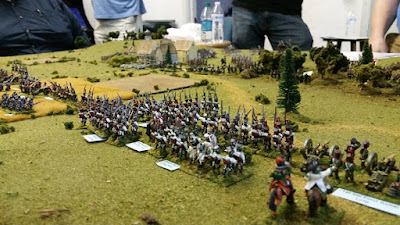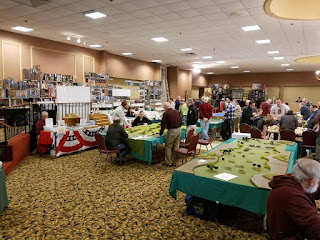The
Chronicles of Aerverdige Skald
Twas during the
twilight of the Gods there arose a group of giants who stalked the earth in
search of power, glory and dominion over their neighbours. Whilst reputations may have dimmed in modern
memory there was a time when these names resounded from the mountaintops and
echoed through the fertile valleys of the world. To the east ruled Reimund
Bjarnesen, Ragnar Lothbrok, Leidolf the Brave and Jagertha the Wise, while King
Macbeth, Owen of Strathclyde and William MacDougal prowled the northern wastes.
To the west were found Brian of Dublin, Fintan Mac Con Midhe, Lord Baker and
Strom of Wessex. And to the south, the names Wulfric of Kent, Baldan the Bold
and William the Bastard drew fear from the stoutest of hearts.
And so it was that war
came to the land. Winter had but recently loosed its grip, when Jarl Lagertha
raised her band to raid the Kingdom of Wessex. Strom stepped up to defend his
lands and prevailed on sacred ground.
His reputation enhanced, Strom was hailed as his people's savior. His
respite was short lived, however. The Viking blood that had consecrated the
ground was barely dry when Strom's hubris rebounded, and his tired forces were
called upon once more. This time Baldan
the Bold invaded. The Normans decimated Strom's forces and gained sovereignty
over an outlying province of Wessex. Baldan's harsh policies almost caused his
people to revolt, but they were quelled by new Warriors who joined the Lord's
cause before bloodshed could erupt.
Strom, meanwhile, retired to lick his wounds and sent out the call to
the Fyrd for bowmen, with no small success.
William the Bastard
took advantage of Baldan's expedition to Wessex and invaded his Norman cousin's
domain. Rushing back to defend his fief,
Baldan issued a challenge to William and the two nobles met at the Hazel
Wands. Rollo was Baldan's chosen whilst
Rufus held William's confidence. The
battle between these two champions was long and mighty. It was not until the sun
was high in the autumnal sky that Rollo landed the final, fatal blow - dashing
Rufus to the ground, his blood consecrating the hallowed field. William and his men rushed forward to avenge
their brother's death and fell into Baldan's trap. Despite celebrating for too long and being
slow to engage, Baldan's forces enticed William into an ill-considered charge,
severely wounding the noble Lord and sending him and his forces back to
Normandy to lick his wounds. Unfortunately, the continuous fighting severely
hurt Baldan's harvests and the victor will be hard pressed to feed his men for
next season's adventurings.
Further to the west,
Reimund Bjarnesen went hunting for lands on the Emerald Isle. Brian of Dublin raised his army and defended
Dublin successfully, severely wounding Reimund in the battle. Despite destroying Dublin's main gateway, the
Danes were forced to return to their ships empty handed. The people of Ireland
were so heartened by their Warlord's success that they proclaimed his Great
Ruler - and many were the songs that the Skalds told across the isle.
Meanwhile in the North,
Owen of Strathclyde and Macbeth vowed to destroy the recent Viking settlements
to the East of their Kingdoms. Unwilling to fully commit his forces to the
cause, Owen decided to merely raid Leidolf - a task he successfully concluded,
wounding Leidolf severely in the process, then returning to his Welsh fastness
much encumbered by Norse gold. Macbeth was more sanguine, raising the Celtic
Clans to descend like a whirlwind on one of Ragnar's villages, putting it to
the torch, and sending his serfs scurrying back to their Lord and Master's
domains. Macbeth kept the region for himself, the land being much fertile and
pleasing to the monarch's eye, and levied a company from the area into his
host.
In the South, Lord
Baker launched a diversonary raid on one of Wulfric of Kent's towns, causing
much damage to the buildngs and crops and returning to his holdings with much
Saxon treasure. Not only was Wulfric prevented from aiding the other
Anglo-Saxon king (Strom, of Wessex fame), but his defeat at Baker's hands caused
such an upswelling of anger, the Wulfric was forced to remain in the area,
stomping out the rebellion. It is perhaps fortunate that Wulfric's bailiffs
quickly identified the ringleader, one Watt Fuller (a dyer from Detling Green).
Wulfric had him hung from the village oak of Woulfburgh as a warning to other
would-be malcontents. The traitor has put the
Ceorls in an odd mood - one of their own has betrayed their oath! Wulfric has
further let it be known that he has summoned the Heoru Dohtor to fight at his
side instead of the Ceorls, should Wulfburgh be assailed next year. It will be
many months before Wulfric fully trusts his men again....
As winter strengthened
her icy grip on the world, the Warlords in their separate fastnesses gathered
their faithful to their longhouses, reaped their harvests and herded their
livestock to their protected barns. The mead was racked, the meat roasted, the
skalds summoned, and the hours passed till the goddess of winter released her
grip. Worshipped by many names - Skadi, Sceadu, Cailleach Bheur or Hodr - the
deities will not be appeased for many months. But memories do not fade, and
animosities will sprout renewed with the spring buds.
The referee of the campaign is Stephen, and with all the players involved, he has done a great job of keeping it going. We (November 2018) are about to start season two. He adapted the rules from the first edition Saga campaign ideas.
The referee of the campaign is Stephen, and with all the players involved, he has done a great job of keeping it going. We (November 2018) are about to start season two. He adapted the rules from the first edition Saga campaign ideas.
























